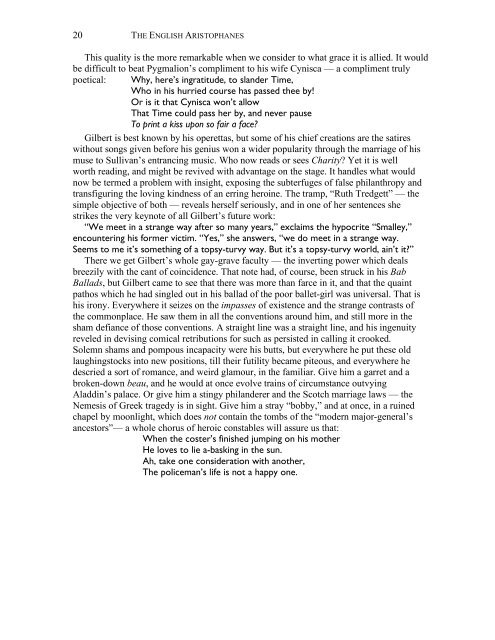WS Gilbert A Mid-Victorian Aristophanes - Haddon Hall
WS Gilbert A Mid-Victorian Aristophanes - Haddon Hall
WS Gilbert A Mid-Victorian Aristophanes - Haddon Hall
You also want an ePaper? Increase the reach of your titles
YUMPU automatically turns print PDFs into web optimized ePapers that Google loves.
20 THE ENGLISH ARISTOPHANES<br />
This quality is the more remarkable when we consider to what grace it is allied. It would<br />
be difficult to beat Pygmalion’s compliment to his wife Cynisca — a compliment truly<br />
poetical: Why, here’s ingratitude, to slander Time,<br />
Who in his hurried course has passed thee by!<br />
Or is it that Cynisca won’t allow<br />
That Time could pass her by, and never pause<br />
To print a kiss upon so fair a face?<br />
<strong>Gilbert</strong> is best known by his operettas, but some of his chief creations are the satires<br />
without songs given before his genius won a wider popularity through the marriage of his<br />
muse to Sullivan’s entrancing music. Who now reads or sees Charity? Yet it is well<br />
worth reading, and might be revived with advantage on the stage. It handles what would<br />
now be termed a problem with insight, exposing the subterfuges of false philanthropy and<br />
transfiguring the loving kindness of an erring heroine. The tramp, “Ruth Tredgett” — the<br />
simple objective of both — reveals herself seriously, and in one of her sentences she<br />
strikes the very keynote of all <strong>Gilbert</strong>’s future work:<br />
“We meet in a strange way after so many years,” exclaims the hypocrite “Smalley,”<br />
encountering his former victim. “Yes,” she answers, “we do meet in a strange way.<br />
Seems to me it’s something of a topsy-turvy way. But it’s a topsy-turvy world, ain’t it?”<br />
There we get <strong>Gilbert</strong>’s whole gay-grave faculty — the inverting power which deals<br />
breezily with the cant of coincidence. That note had, of course, been struck in his Bab<br />
Ballads, but <strong>Gilbert</strong> came to see that there was more than farce in it, and that the quaint<br />
pathos which he had singled out in his ballad of the poor ballet-girl was universal. That is<br />
his irony. Everywhere it seizes on the impasses of existence and the strange contrasts of<br />
the commonplace. He saw them in all the conventions around him, and still more in the<br />
sham defiance of those conventions. A straight line was a straight line, and his ingenuity<br />
reveled in devising comical retributions for such as persisted in calling it crooked.<br />
Solemn shams and pompous incapacity were his butts, but everywhere he put these old<br />
laughingstocks into new positions, till their futility became piteous, and everywhere he<br />
descried a sort of romance, and weird glamour, in the familiar. Give him a garret and a<br />
broken-down beau, and he would at once evolve trains of circumstance outvying<br />
Aladdin’s palace. Or give him a stingy philanderer and the Scotch marriage laws — the<br />
Nemesis of Greek tragedy is in sight. Give him a stray “bobby,” and at once, in a ruined<br />
chapel by moonlight, which does not contain the tombs of the “modern major-general’s<br />
ancestors”— a whole chorus of heroic constables will assure us that:<br />
When the coster’s finished jumping on his mother<br />
He loves to lie a-basking in the sun.<br />
Ah, take one consideration with another,<br />
The policeman’s life is not a happy one.







